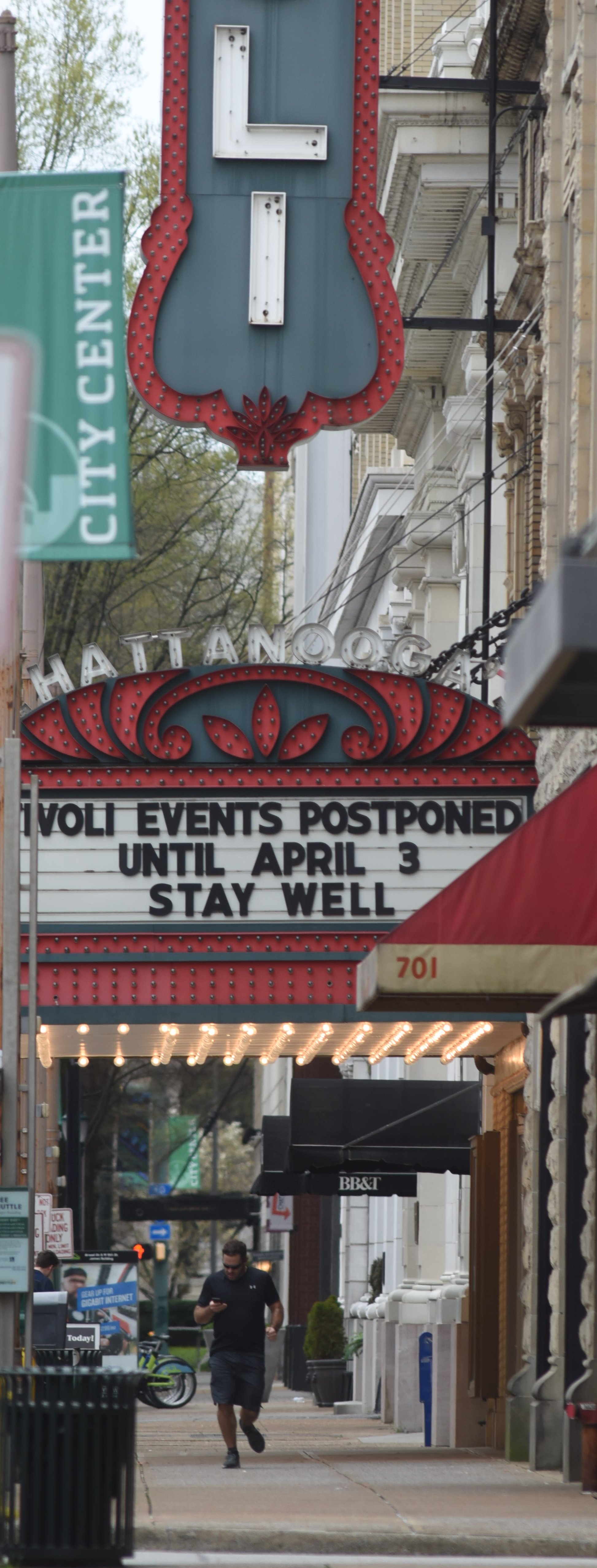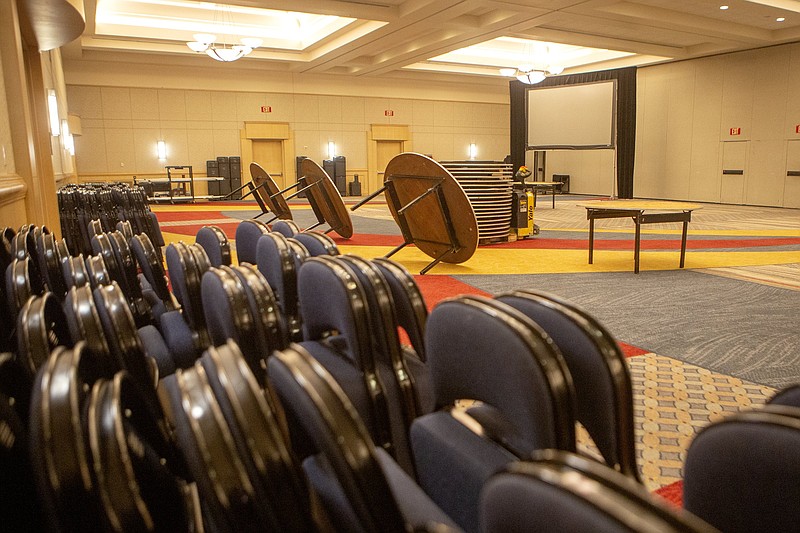For large venues that earn their keep by drawing big crowds, 2020 was a worst-case scenario. But the latest round of federal stimulus aid shines a welcome spotlight on those theaters, said Nick Wilkinson, executive director of the Tivoli Foundation.
"This latest stimulus package, the Save Our Stages act was part of that, and we should be eligible for that, and I'm very hopeful that will help," said Wilkinson, whose nonprofit organization oversees the Tivoli, as well as Memorial Auditorium and the Walker Theatre on the Memorial's second floor. "We're still in the process of laying out some of the finer points and details. Every bit we can cobble together will be necessary to make it through."
Before the pandemic, the three venues typically were taking in about $10 million in annual revenue, hosting about 270 events a year, from ballet and symphony performances to Broadway shows.
"When you're making in excess of $10 million in earned revenue and you go from that to zero, effectively, it's just a gaping hole," Wilkinson said. "We've lost since the shutdown $8.5 million to $9 million in projected revenue."
The $15 billion Save Our Stages act authorizes the Small Business Administration to make grants of up to $12 million to live venue operators, producers, promoters, or talent representatives to address the economic fallout of the COVID-19 pandemic. That money is for needs that surfaced in 2020, but a second, supplemental grant for 50% of the initial grant amount can be used for needs in the first half of 2021.
The devil, though, is in the details, said Mike Shuford, executive director of the Chattanooga Convention Center. He's still trying to understand whether the Convention Center will even qualify, and how the funds would need to be used, he said.
"I don't know enough about it yet to consider it, and I've got a call in to our attorneys for the labor portion," said Shuford, who has a skeleton crew of 10 people keeping the center going while another 75 people were laid off.
The venue normally hosts 40 to 45 events a month, but - with the exception of weekend holiday markets in December - it's been down to two or three small gatherings since calendars began imploding in March, Shuford said. Tennessee Gov. Bill Lee's recent announcement limiting gatherings to 10 people in light of a surge of COVID-19 cases all but wiped January events off the slate, he added.
"Just like everybody else, if you'd asked me last March if this would still be going on now, I'd have said no way," Shuford said.
The center still has about $1.3 million in financial reserves, down from a $2 million fund it had at the start of the year, Shuford said. The problem is, that money is supposed to be for capital expenses when they arise.
"If we have a roof that goes bad, we're looking at $1 million," he said. "A chiller is $250,000."
 Staff photo by Tim Barber/ Third shift railroad control tower employee Will Bryan nears the end of his 4-mile run in March 2020, as he passes under the Tivoli Theater marquee displaying a message wishing the public well on Broad Street in downtown Chattanooga. The theater has lost $8.5 million to $9 million in revenue during the pandemic.
Staff photo by Tim Barber/ Third shift railroad control tower employee Will Bryan nears the end of his 4-mile run in March 2020, as he passes under the Tivoli Theater marquee displaying a message wishing the public well on Broad Street in downtown Chattanooga. The theater has lost $8.5 million to $9 million in revenue during the pandemic.IMPROVISATIONAL THEATER
Forgivable federal Paycheck Protection Program funds helped the Tivoli Foundation keep its staff of 13 full-time and two part-time employees in place in the early stages of the crisis, Wilkinson said. They all took pay cuts and kept plugging away, he said.
"We compiled a lot of projects right away and said, look, we're going to make the most of this," he said.
Tivoli Foundation employees helped launch the Chattanooga Gathering Group with partners including AT&T Park, Finley Stadium, the Songbirds music venue - which closed in August - and the Signal Mountain Playhouse to start crafting guidelines to think through safely reopening. They also worked with a statewide group of venues and continued to pursue plans for restoration of the Tivoli, which turns 100 in 2021.
"Some of that had to be suspended - it's not a great time for fundraising - but we are on track with planning and working with architects," Wilkinson said.
Eventually, though, the Paycheck Protection Program funds that kept folks employed ran dry, and in September the foundation furloughed, and then ultimately laid off, six employees, he said.
"Our monthly cash burn is about $75,000 a month - that's what we lose with any revenue coming in since we went into this," Wilkinson said. "At some point we had to make the tough decision with this going longer than anybody ever imagined."
Once he understands what the Save Our Stages funding might entail, he'll know more about whether and when he can bring people back, Wilkinson added.
"If it materializes the way we hope it would, we would plan to start aggressively rehiring," he said. "Before this all hit, we were planning to grow."
He and his staff have done the work to be ready once the applications are open for Save Our Stages, Wilkinson added.
"If we're not the first in, I don't know who will be," he said. "We said, let's have it all ready so when they say go we'll be the first ones there."
Since the Tivoli Foundation was established in 2015, it has invested aggressively in improving the venues and bringing more and better shows to Chattanooga, and that has helped the organization weather this crisis, he said.
"We are lucky we had some really great years and were able to somewhat make it through this," Wilkinson said.
At the Convention Center, Shuford said he passed on the Paycheck Protection Program funds in part because his employees were better off on unemployment, given the $600 a week added to payments through July, and the $300 supplement through October.
"With the stimulus money, you had to keep people working," Shuford said. "We're a service industry, there's nothing for people to do. If you're a company or a manufacturer you can make stuff for stock and, to be honest, the employees did quite well with the unemployment for the first six months - a lot of them were making more money than they did working."
But if it emerges that the center qualifies for the Save Our Stages money, and it makes sense to pursue it, he'll chase it hard, Shuford added.
"I don't think there's a silver bullet out there for how to help us get through this," he said. "It's going to take all of these various sources, and we're working our tails off to try to cobble anything together."
Contact Mary Fortune at mfortune@timesfreepress.com. Follow her on Twitter @maryfortune.
